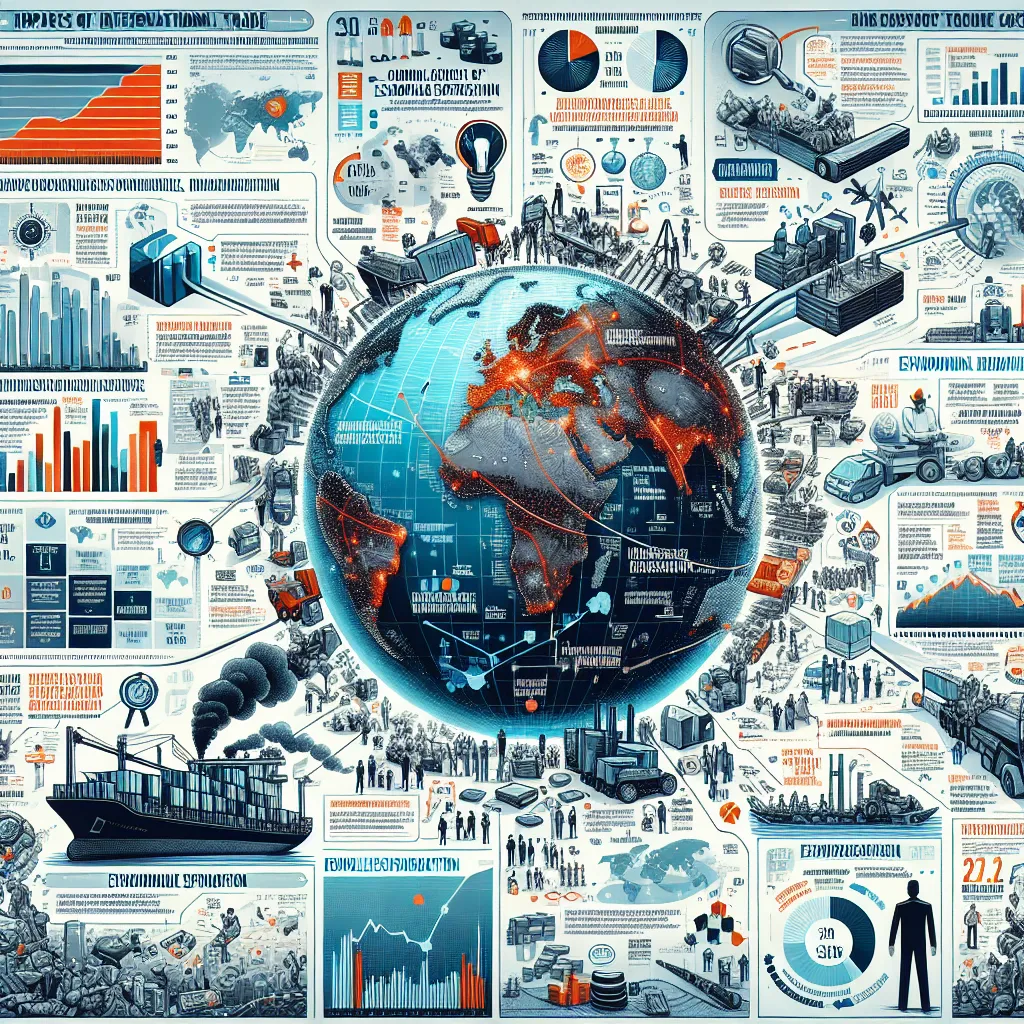Global trade and its impact on developing nations is a recurring theme in IELTS Writing Task 2. Based on recent trends and historical data from past IELTS exams, this topic has a high probability of appearing in future tests. Let’s explore a sample question and analyze multiple essay responses to help you prepare effectively for this crucial aspect of the IELTS exam.
Nội dung bài viết
Analyzing the Question
Some people believe that globalization and international trade are having negative effects on developing countries. To what extent do you agree or disagree?
This question requires you to discuss the impact of globalization and international trade on developing nations. It’s essential to:
- Clearly state your position
- Provide balanced arguments
- Support your points with relevant examples
- Conclude by summarizing your main arguments
Let’s examine three sample essays of varying quality to understand what distinguishes a high-scoring response from a lower-scoring one.
 Effects of Global Trade on Developing Nations
Effects of Global Trade on Developing Nations
Sample Essay 1 (Band 8-9)
Globalization and international trade have become integral parts of the modern world economy, profoundly impacting developing nations. While some argue that these phenomena have detrimental effects on emerging economies, I believe that the benefits significantly outweigh the drawbacks.
The positive impacts of globalization and international trade on developing countries are manifold. Firstly, these processes open up new markets for goods and services, allowing developing nations to boost their exports and stimulate economic growth. For instance, countries like Vietnam and Bangladesh have seen remarkable economic progress due to their integration into global supply chains, particularly in the textile and electronics industries. Secondly, globalization facilitates the transfer of technology and knowledge from developed to developing countries, enabling the latter to modernize their industries and improve productivity. A prime example is the rapid technological advancement in India’s IT sector, which has been largely driven by international collaborations and outsourcing arrangements.
However, it would be remiss to ignore the potential drawbacks. Critics argue that globalization can lead to the exploitation of workers in developing countries, with multinational corporations often prioritizing profit over fair labor practices. Additionally, there are concerns about the environmental impact of increased industrial activity in nations with less stringent regulations. These are valid concerns that require careful consideration and policy interventions.
Nevertheless, I contend that the overall impact of globalization and international trade on developing nations is positive. The economic opportunities created far outweigh the challenges, provided that governments implement appropriate regulatory frameworks. For example, many developing countries have used their increased wealth from trade to invest in education, healthcare, and infrastructure, thereby improving the overall quality of life for their citizens. Furthermore, participation in the global economy encourages developing nations to adopt international standards and best practices, which can lead to improvements in governance and institutional quality.
In conclusion, while globalization and international trade present certain challenges for developing countries, their overall effect is predominantly positive. The key lies in harnessing the benefits while mitigating the potential negative impacts through sound policies and international cooperation. As developing nations continue to integrate into the global economy, they stand to gain significantly in terms of economic growth, technological advancement, and improved living standards for their populations.
(Word count: 345)
Analysis of Band 8-9 Essay
This essay demonstrates excellent command of the English language and addresses all parts of the question effectively. Here’s why it would score in the Band 8-9 range:
-
Task Achievement: The essay presents a clear position and fully addresses all parts of the task. It provides a balanced view, acknowledging both positive and negative aspects of globalization and international trade.
-
Coherence and Cohesion: The essay is well-organized with clear progression throughout. It uses cohesive devices effectively (e.g., “Firstly,” “Secondly,” “However,” “Nevertheless”) and each paragraph has a clear central topic.
-
Lexical Resource: The writer uses a wide range of vocabulary with very natural and sophisticated control of lexical features. Examples include “manifold,” “stimulate economic growth,” “integration into global supply chains,” and “remiss.”
-
Grammatical Range and Accuracy: The essay demonstrates a wide range of structures with full flexibility and accuracy. It uses complex sentences without any noticeable errors.
-
Examples and Supporting Ideas: The essay provides specific, relevant examples to support its arguments, such as mentioning Vietnam, Bangladesh, and India’s IT sector.
Sample Essay 2 (Band 6-7)
In today’s world, globalization and international trade are important topics. Some people think these things are bad for developing countries, but I partly disagree with this idea.
There are some good things about globalization and international trade for developing countries. First, it helps these countries sell more things to other countries. This can make more money for the country and create jobs for people. For example, many factories in China make products for companies in other countries, which has helped China’s economy grow. Also, when countries trade with each other, they can learn new ways of doing things and get better technology.
However, there are also some problems that can happen. Sometimes big companies from rich countries don’t treat workers in poor countries fairly. They might pay very low wages or make people work in bad conditions. Another problem is that some local businesses in developing countries might close because they can’t compete with big international companies.
I think that overall, globalization and international trade are more helpful than harmful to developing countries. Even though there are some problems, the benefits are bigger. Many developing countries have been able to grow their economies and improve life for their people because of international trade. But it’s important for governments to make rules to protect workers and local businesses.
In conclusion, while globalization and international trade can cause some problems for developing countries, I believe they are mostly good. The key is to find ways to get the benefits while avoiding the bad things as much as possible.
(Word count: 269)
Analysis of Band 6-7 Essay
This essay demonstrates a reasonable command of the English language and addresses the main parts of the question. Here’s why it would score in the Band 6-7 range:
-
Task Achievement: The essay presents a clear position and addresses the main parts of the task. However, the ideas could be more fully developed and supported.
-
Coherence and Cohesion: The essay is generally well-organized, but the use of cohesive devices is sometimes mechanical. Paragraphing is evident, but not always logical.
-
Lexical Resource: The essay uses an adequate range of vocabulary for the task. There are attempts to use less common vocabulary (e.g., “compete,” “overall”), but with some inaccuracy.
-
Grammatical Range and Accuracy: The essay uses a mix of simple and complex sentence forms. There are some errors, but they do not impede communication.
-
Examples and Supporting Ideas: The essay provides some examples, but they are not as specific or well-developed as in the Band 8-9 essay.
Sample Essay 3 (Band 5-6)
Globalization and international trade are big topics today. Some people say they are bad for poor countries. I think this is partly true and partly not true.
Good things about globalization for poor countries:
- They can sell things to other countries
- They can get new jobs
- They can learn new things from other countries
Bad things about globalization for poor countries:
- Big companies might not treat workers well
- Local shops might close
- The environment might get damaged
I think globalization has both good and bad points. It can help countries make more money, but it can also cause problems. Governments need to be careful and make good rules.
In the end, I think globalization is more good than bad for poor countries. But we need to be careful and try to fix the problems it can cause.
(Word count: 130)
Analysis of Band 5-6 Essay
This essay demonstrates a limited command of the English language and addresses the question in a basic way. Here’s why it would score in the Band 5-6 range:
-
Task Achievement: The essay presents a position, but the development of ideas is limited. The response is mostly relevant but lacks detail.
-
Coherence and Cohesion: The essay has some organization, but there is a lack of overall progression. The use of cohesive devices is limited and sometimes inaccurate.
-
Lexical Resource: The essay uses a limited range of vocabulary. The same words and phrases are often repeated.
-
Grammatical Range and Accuracy: The essay uses mainly simple sentences. There are frequent grammatical errors, but the meaning is still clear.
-
Examples and Supporting Ideas: The essay provides very few specific examples or supporting ideas.
Key Vocabulary to Remember
-
Globalization (noun) /ˌɡləʊbəlaɪˈzeɪʃən/ – the process by which businesses or other organizations develop international influence or start operating on an international scale
-
International trade (noun phrase) /ˌɪntəˈnæʃənəl treɪd/ – the exchange of capital, goods, and services across international borders or territories
-
Developing countries (noun phrase) /dɪˈveləpɪŋ ˈkʌntriz/ – low and middle-income countries in which the majority of people have a lower standard of living with access to fewer goods and services than do most people in high-income countries
-
Economic growth (noun phrase) /ˌiːkəˈnɒmɪk ɡrəʊθ/ – an increase in the amount of goods and services produced per head of the population over a period of time
-
Exploitation (noun) /ˌeksplɔɪˈteɪʃən/ – the action or fact of treating someone unfairly in order to benefit from their work
-
Multinational corporations (noun phrase) /mʌltiˈnæʃənl kɔːpəˈreɪʃənz/ – companies that operate in several countries
-
Infrastructure (noun) /ˈɪnfrəstrʌktʃə(r)/ – the basic physical and organizational structures and facilities needed for the operation of a society or enterprise
-
Supply chains (noun phrase) /səˈplaɪ tʃeɪnz/ – the network of all the individuals, organizations, resources, activities and technology involved in the creation and sale of a product
-
Regulatory frameworks (noun phrase) /ˈreɡjələtəri ˈfreɪmwɜːks/ – systems of regulations and the means to enforce them, usually established by a government to regulate a specific activity
-
Labor practices (noun phrase) /ˈleɪbə ˈpræktɪsɪz/ – the policies and procedures that regulate working conditions
Conclusion
The effects of global trade on developing nations is a complex and nuanced topic that frequently appears in IELTS Writing Task 2. To excel in writing about this subject, it’s crucial to present a balanced argument, provide specific examples, and use a range of sophisticated vocabulary and grammatical structures.
For practice, try writing your own essay on this topic:
Some argue that the benefits of globalization are outweighed by its drawbacks for developing countries. Discuss both views and give your own opinion.
Remember to plan your essay carefully, use specific examples, and aim for a word count of 250-300 words. Feel free to share your practice essays in the comments section for feedback and discussion. Good luck with your IELTS preparation!


